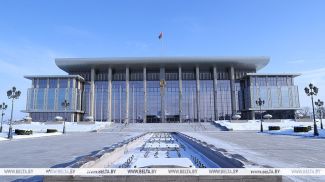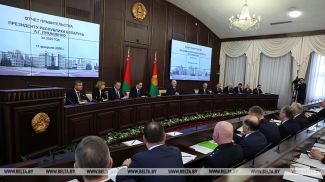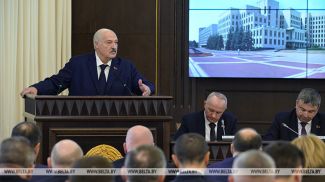BISHKEK, 28 November (BelTA) – Speaking at the summit of the Collective Security Treaty Organization in Bishkek, Belarus President Aleksandr Lukashenko focused on peace initiatives and global security threats, BelTA has learned.
The Belarusian leader focused on the most sensitive issues for Belarus. The head of state voiced his concern over political and economic clashes between global superpowers and named factors that can seriously damage the entire system of international security.
Aleksandr Lukashenko mentioned the termination of the Intermediate-Range Nuclear Forces Treaty. In this regard, Belarus suggests adopting a declaration of responsible countries against placing medium-range and shorter-range missiles in Europe. “We believe that this initiative has the potential to restore trust in the region,” the head of state said.
Belarus also put forward an initiative to resume an inclusive dialogue on international security. “As a country that experienced many dramatic events in the past Belarus calls for resuming a broad international security dialogue similar to the Helsinki process and to use this dialogue to overcome existing disagreements between countries in the common space in the Euro-Atlantic region and Eurasia,” Aleksandr Lukashenko said.
Belarus is ready to discuss these issues in greater detail within the framework of the CSTO. “After all, today we are witnessing destruction of arms control mechanisms, increasing military buildup, and expansion of military infrastructure in the European region. In fact, we are facing an open and groundless militarization of the CSTO's western borders,” the Belarusian leader emphasized.
In recent years NATO's military presence (including the U.S. forces) in the countries bordering Belarus has increased several times. The alliance is deploying more troops and equipment in close vicinity to Belarus' border. In addition to that, NATO is conducting large-scale multinational exercise nearby.
“We do not need a new arms race,” the president emphasized.
A high level of tensions in international relations is a serous risk factor, too. Another recent trend is the increasing protest movement and civil unrest in a number of countries, including prosperous ones. A major contributor to instability is a policy of sanctions that runs afoul of international law, as well as external hybrid action.
According to the head of state, regional armed conflicts, including frozen ones, remain one of the major sources of political, military and terrorist threats, illegal migration and smuggling of arms. In this context, the president mentioned the situation in the east of Ukraine where a military conflict has been going on for five years already. This conflict results in the loss of human life, including civilian casualties.
Belarus welcomes some visible progress in implementing the Minsk agreements and the start of a constructive dialogue as part of the Trilateral Contact Group.
Aleksandr Lukashenko noted that the situation around the CSTO responsibility zone is changing dramatically. “I am convinced that our organization should adequately and promptly respond to new challenges and threats, undertake a detailed and comprehensive analysis of the situation and work out appropriate measures and initiatives. Acting an important security mechanism in the Eurasian region, the CSTO should gradually expand its foreign policy vector and strengthen its international profile,” the Belarusian leader said.
Aleksandr Lukashenko also called for bolstering the international standing of the CSTO, expanding its cooperation with other organizations. This can be achieved, among other things, by implementing Belarus-proposed decision on the formalization of the Partner and Observer statuses in the organization. Reliable allies could help improve the efficiency of collective efforts in combating terrorism and illegal drugs and in maintaining military security.
The head of state put forward another initiative in Bishkek. Aleksandr Lukashenko believes that in order to maintain military security in the CSTO member states, it is necessary, among other things, to establish a direct and equal dialogue with NATO. This is particularly relevant taking into consideration that these two military and political blocs are responsible for ensuring security from Vancouver to Vladivostok. At the same time, the CSTO and the OSCE, for example, maintain a regular and constructive dialogue.
It is also important to deepen cooperation with the United Nations, Aleksandr Lukashenko added.
Belarus deems it necessary to build up anti-terrorist capacity of the CSTO.
Aleksandr Lukashenko emphasized that information security should be among the priorities for the CSTO. The existing threats necessitate closer interstate cooperation and greater trust in information field. In this regard, Belarus suggests establishing a good-neighborliness belt aimed at easing tensions in the information field and laying down common rules of responsible behavior in the digital space.













